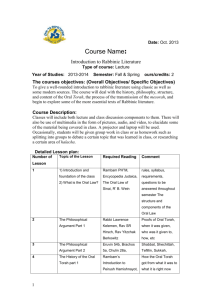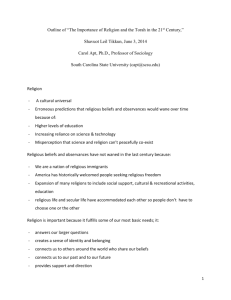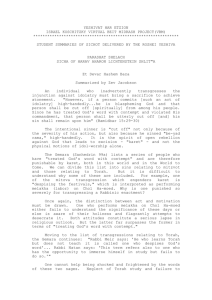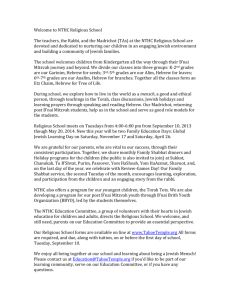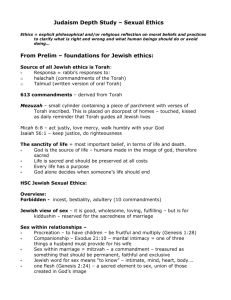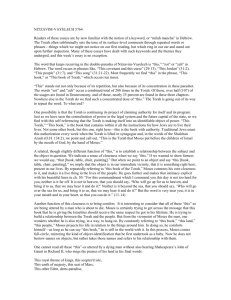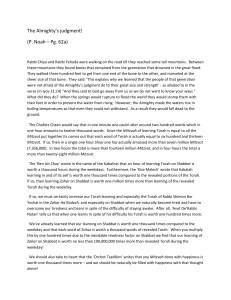פרשת משפטים Our Parsha includes, among its many Halachos, the
advertisement
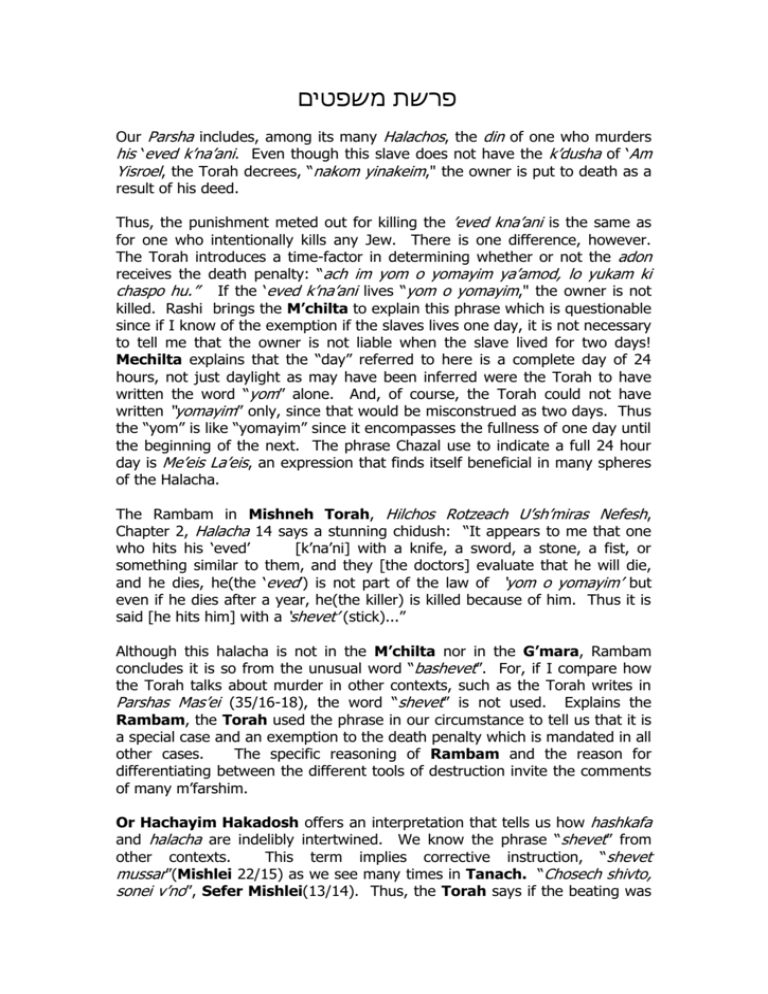
פרשת משפטים Our Parsha includes, among its many Halachos, the din of one who murders his ‘eved k’na’ani. Even though this slave does not have the k’dusha of ‘Am Yisroel, the Torah decrees, “nakom yinakeim," the owner is put to death as a result of his deed. Thus, the punishment meted out for killing the ’eved kna’ani is the same as for one who intentionally kills any Jew. There is one difference, however. The Torah introduces a time-factor in determining whether or not the adon receives the death penalty: “ach im yom o yomayim ya’amod, lo yukam ki chaspo hu.” If the ‘eved k’na’ani lives “yom o yomayim," the owner is not killed. Rashi brings the M’chilta to explain this phrase which is questionable since if I know of the exemption if the slaves lives one day, it is not necessary to tell me that the owner is not liable when the slave lived for two days! Mechilta explains that the “day” referred to here is a complete day of 24 hours, not just daylight as may have been inferred were the Torah to have written the word “yom” alone. And, of course, the Torah could not have written “yomayim” only, since that would be misconstrued as two days. Thus the “yom” is like “yomayim” since it encompasses the fullness of one day until the beginning of the next. The phrase Chazal use to indicate a full 24 hour day is Me’eis La’eis, an expression that finds itself beneficial in many spheres of the Halacha. The Rambam in Mishneh Torah, Hilchos Rotzeach U’sh’miras Nefesh, Chapter 2, Halacha 14 says a stunning chidush: “It appears to me that one who hits his ‘eved’ [k’na’ni] with a knife, a sword, a stone, a fist, or something similar to them, and they [the doctors] evaluate that he will die, and he dies, he(the ‘eved’) is not part of the law of ‘yom o yomayim’ but even if he dies after a year, he(the killer) is killed because of him. Thus it is said [he hits him] with a ‘shevet’ (stick)...” Although this halacha is not in the M’chilta nor in the G’mara, Rambam concludes it is so from the unusual word “bashevet”. For, if I compare how the Torah talks about murder in other contexts, such as the Torah writes in Parshas Mas’ei (35/16-18), the word “shevet” is not used. Explains the Rambam, the Torah used the phrase in our circumstance to tell us that it is a special case and an exemption to the death penalty which is mandated in all other cases. The specific reasoning of Rambam and the reason for differentiating between the different tools of destruction invite the comments of many m’farshim. Or Hachayim Hakadosh offers an interpretation that tells us how hashkafa and halacha are indelibly intertwined. We know the phrase “shevet” from other contexts. This term implies corrective instruction, “shevet mussar”(Mishlei 22/15) as we see many times in Tanach. “Chosech shivto, sonei v’no”, Sefer Mishlei(13/14). Thus, the Torah says if the beating was done as an act of instruction, as Mussar, it is less severe than when undertaken as violence alone. If even this “instructive” beating was so severe that the ‘eved died immediately, then the owner receives the death penalty as any other murderer. If it was not as severe, the ‘eved did not die within this “Full Day” we relate to the owner as not having intended to kill and he is thus exempt from the death penalty. -2Does this Parsha have any meaning to us when slavery does not exist, when there is no longer the institution of ‘eved k’na’ani? Perhaps we can see in it a reflection of our relationship to Ribbono Shel ‘Olam and a derech through which we can understand our place in the world. We are the ‘eved and He is the Master. We have been struck. We need to evaluate the blow and to understand its meaning. Was it meant to kill or was it intended to be instructive? Was it the kli barzel of the murderer or the shevet mussar of the teacher? Our Parsha teaches us the answer. We are bid to view the punishment and see whether it was immediately destructive or it allowed life to continue. If the devastation took effect immediately, within the me’eis la’eis than we know it was intended to kill. If we were able to arise again, to continue to live, even with the impairments caused by the blows, then we know that what befell us was instructive, not destructive. We are always aware of the Golus that is our lot for 2000 years. We are cognizant of Churban Beis HaMikdash so we recite on our happiest of days, “u’mip’nei chatoseinu galinu meiartzeinu”. In the very midst of rejoicing, our simcha is tempered per force by the realization that it is incomplete. At the same time we need to understand that it was not merely a respite given to us by the fact that our lives continue onward, rather the enduring existence that we have is testimony as to why the punishments befell us. Not for the purpose of obliteration have we been pummeled, but rather to give us guidance with a most firm Hand. When we find ourselves despondent we can remember our Parsha and the message of the ‘eved and be able to perceive, in the midst of sorrow and tragedy, the subtle hint of Redemption that awaits us. If that is the attitude we undertake then we can look to HaKodosh Boruch Hu and ask Him, as our Master, to fulfill the words of the Rambam in Mishnah Torah at the very end of Hilchos ‘Avodim(9/8): It is permissible to enslave the ‘eved k’na’ani with back-breaking labor. And, even though the law is so, the middas chassidus and way of wisdom is that a person should be merciful, pursue justice and not make the yoke of his servant heavy upon him...For it says: ‘k’einei ‘avadim el yad adoneihem k’einei shifcha el yad g’virtah(Thillim 123/2) ...The descendants of Avraham Avinu, Israel upon whom Hakadosh Baruch Hu showered with the goodness of the Torah and commanded them with Chukim and Mishpatim Tzaddikim, they are merciful upon all. And all that are merciful, mercy is bestowed upon them... Shabbat Shalom Rabbi Pollock

